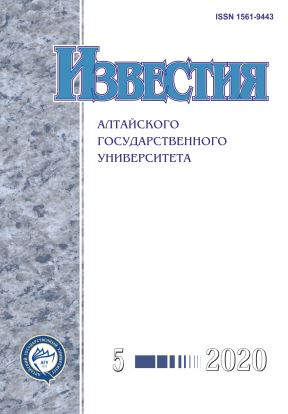The Narratives of Muslim Women of Central Asia about "Liberation": the Voice of the Subaltern? (1920s-1930s)
УДК 94(575.1) ББК 63.3(2) 6-3
Abstract
This article examines the narratives of Muslim women in Central Asia about their experience of their emancipation. Gender issues occupy an important place in postcolonial studies which have progressed rapidly in recent decades. Can the analytical language and approaches develop within the framework of postcolonial studies be applied to the study of Soviet history? This issue continues to be the subject of discussion among Russian and Western authors. However, it is obvious that when studying some aspects of the life of Soviet society, it is impossible to ignore the experience of studying colonial and postcolonial societies. The author, repeating the question posed by postcolonial researchers about whether the Subaltern can speak, tries to answer it by focusing on the narratives of Muslim women in Central Asia about “liberation”. These narratives were an important part of the Soviet discourse on the emancipation of women. Muslim women's gaining a voice (individual and collective) was seen as an important indicator of the success of policies aimed at "liberating" women. Analysis of Muslim women's narratives about "liberation" provided an opportunity to see the similarity of their structure, as well as how the structure of narratives changed in the 1930s.
Downloads
Metrics
References
Спивак Г.Ч. Могут ли угнетенные говорить? // Введение в гендерные исследования. Ч. II: Хрестоматия. Харьков ; СПб., 2001.
Конрад С. Что такое глобальная история? М., 2018.
Абашин С. Нации и постколониализм в Центральной Азии двадцать лет спустя: переосмысливая категории анализа / практики // Ab Imperio. 2011. № 3.
Адамс Л. Применима ли колониальная теория к Центральной Евразии? // Неприкосновенный запас. 2009. № 4.
Зубковская О. Применима ли и как западная постколониальная теория для анализа постсоветского феминизма (на примере категорий советского и постсоветского «востока») // Гендерные исследования. 2008. № 18.
Постсоветское сознание и postcolonial studies. От редактора // Новое литературное обозрение. 2008. № 9.
Юрчак А. Это было навсегда, пока не кончилось. Последнее советское поколение. М., 2014.
Российский государственный архив социально-политической истории (РГАСПИ). Ф. 17. Оп.114. Д. 734.
Великий Октябрь и раскрепощение женщин Средней Азии и Казахстана. (1917-1936 гг.) : сборник документов и материалов / под ред. Астапович. М., 1971.
Parker H. Voices of the New Soviet Woman: Gender, Emancipation and Agency in Letters to the Soviet State, 19241941. PhD thesis, University of Sheffield, 2018.
Massell G.J. The Surrogate Proletariat: Moslem Women and Revolutionary Strategies in Soviet Central Asia, 1919 — 1929. Princeton, 1974.
Щурко Т. «Женщина Востока»: советский гендерный порядок в Центральной Азии между колонизацией и эмансипацией // Понятия о советском в Центральной Азии. Альманах №2 / сост. и ред. Г. Мамедов, О. Шаталова. Бишкек, 2016.
РГАСПИ. Ф. 544. Оп. 4. Д. 32.
Бабаджанов Б.М. Рай у ног матерей и женщин. Советские и постсоветские дискурсы форм эмансипации мусульманских женщин // Центр изучения региональных угроз. 17.05.2012. URL: https://crss.uz/2012/05/17/raj-u-nog-materej-i-zhenshhin-sovetskie-i-postsovetskie-diskursy-form-emansipacii-musulmanskix-zhenshhin/ (дата обращения: 08.08.2020).
Нортроп Д. Ограниченное освобождение: гендер, революция и паранджа в повседневной жизни в Советском Узбекистане // CAA Network. URL: https://caa-network.org/archives/8785 (дата обращения: 20.08.2020).
Izvestiya of Altai State University is a golden publisher, as we allow self-archiving, but most importantly we are fully transparent about your rights.
Authors may present and discuss their findings ahead of publication: at biological or scientific conferences, on preprint servers, in public databases, and in blogs, wikis, tweets, and other informal communication channels.
Izvestiya of Altai State University allows authors to deposit manuscripts (currently under review or those for intended submission to Izvestiya of Altai State University) in non-commercial, pre-print servers such as ArXiv.
Authors who publish with this journal agree to the following terms:
- Authors retain copyright and grant the journal right of first publication with the work simultaneously licensed under a Creative Commons Attribution License (CC BY 4.0) that allows others to share the work with an acknowledgement of the work's authorship and initial publication in this journal.
- Authors are able to enter into separate, additional contractual arrangements for the non-exclusive distribution of the journal's published version of the work (e.g., post it to an institutional repository or publish it in a book), with an acknowledgement of its initial publication in this journal.
- Authors are permitted and encouraged to post their work online (e.g., in institutional repositories or on their website) prior to and during the submission process, as it can lead to productive exchanges, as well as earlier and greater citation of published work (See The Effect of Open Access).








